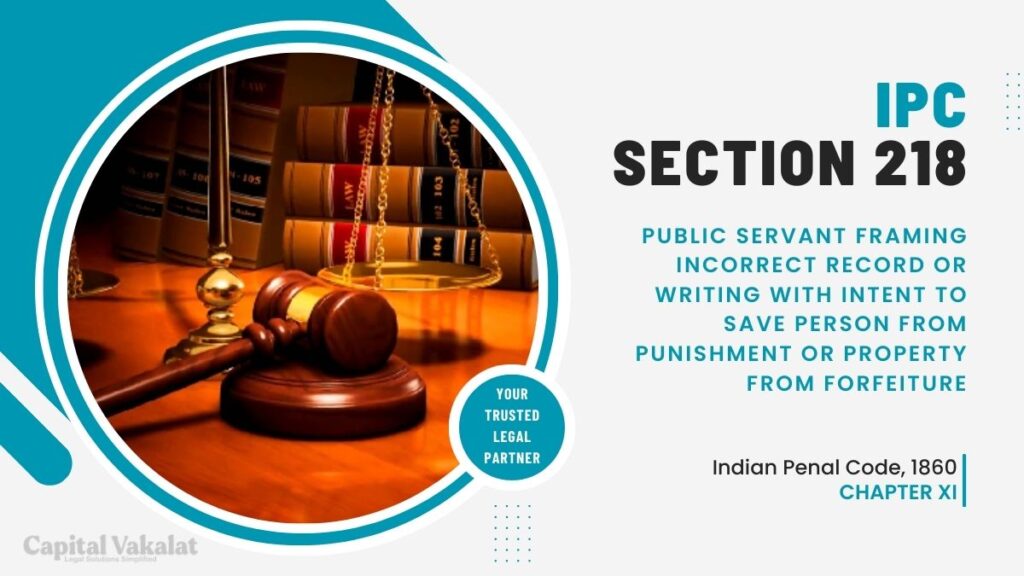Public servants are entrusted with the responsibility to uphold the law and maintain the highest standards of integrity. However, there are instances when public servants may act in a manner that is contrary to these principles. Section 218 of the Indian Penal Code (IPC) addresses a particular aspect of misconduct by public servants, specifically dealing with the framing of incorrect records or writing with the intent to save a person from punishment or property from forfeiture.

In this article, we will delve into the details of Section 218 IPC, understanding its implications, and exploring its significance in the legal landscape of India.
Understanding Section 218 IPC
Section 218 of the IPC falls under the category of offenses related to public servants. It deals with situations where a public servant frames incorrect records or intentionally writes something with the motive of saving an individual from punishment or preventing the forfeiture of property. This section aims to maintain transparency and accountability within the government machinery by discouraging dishonest or corrupt practices by public servants.
Elements of Section 218 IPC
To establish an offense under Section 218 IPC, several key elements must be present:
1. Public Servant:
The accused must be a public servant, which includes government officials, officers, or any person employed by the government.
2. Framing Incorrect Record:
The public servant must be involved in framing a record. This could involve creating false documents, altering records, or providing misleading information.
3. Intent to Save a Person or Property:
The critical aspect is the intent behind the act. The public servant must have the intention of saving a person from punishment or preventing the forfeiture of property. This demonstrates a deliberate misuse of power.
Punishment under Section 218 IPC
In case of a conviction under Section 218 IPC, the guilty public servant may face imprisonment, which can extend up to three years. Additionally, they may also be liable to pay a fine.
Landmark Cases
Several noteworthy cases have highlighted the application of Section 218 IPC. One such case is the State of Punjab vs. Raja Ram, where the Supreme Court observed that even the act of withholding information with an intention to protect someone from punishment could fall under the purview of this section.
Significance of Section 218 IPC
This section holds great significance as it acts as a deterrent against corrupt practices within the public service sector. It ensures that public servants act with honesty and integrity in their duties, protecting the interests of the public and the rule of law.
Challenges in Enforcing Section 218 IPC
Enforcing Section 218 IPC can be challenging due to various factors. One common obstacle is the reluctance of witnesses to testify against public servants, fearing potential repercussions. This often results in cases going unreported or underreported.
Safeguards and Protections
The legal system provides safeguards to protect honest public servants from false allegations under Section 218 IPC. The burden of proof lies with the prosecution, and the accused is considered innocent until proven guilty. This ensures a fair and just legal process.
Criticisms and Controversies
Section 218 IPC has not been without its share of criticisms. Some argue that it may be misused to target innocent public servants due to political or personal vendettas. Balancing the need to prevent corruption with protecting the rights of public servants is an ongoing challenge.
Conclusion
Section 218 IPC plays a vital role in maintaining the integrity of public servants and preventing corruption within the system. It acts as a deterrent against the framing of incorrect records with the intent to save individuals from punishment or protect property from forfeiture. While it has its challenges and criticisms, the section remains a crucial part of the Indian legal framework, serving the interests of justice and the rule of law.
Frequently Asked Questions
Can public servants be falsely accused under Section 218 IPC?
Yes, public servants can be falsely accused, but the burden of proof lies with the prosecution, and the accused is considered innocent until proven guilty.
What is the maximum punishment under Section 218 IPC?
The guilty public servant may face imprisonment of up to three years and may be liable to pay a fine.
Are there any safeguards to protect public servants from false allegations?
Yes, the legal system provides safeguards to protect honest public servants from false allegations, ensuring a fair and just legal process.
How does Section 218 IPC contribute to maintaining transparency in government?
Section 218 IPC contributes to maintaining transparency by discouraging dishonest practices and ensuring accountability within the government machinery.